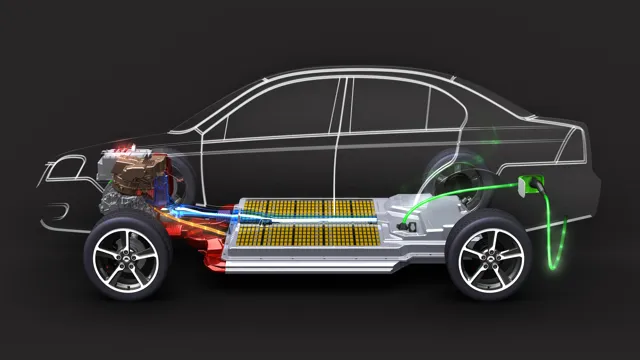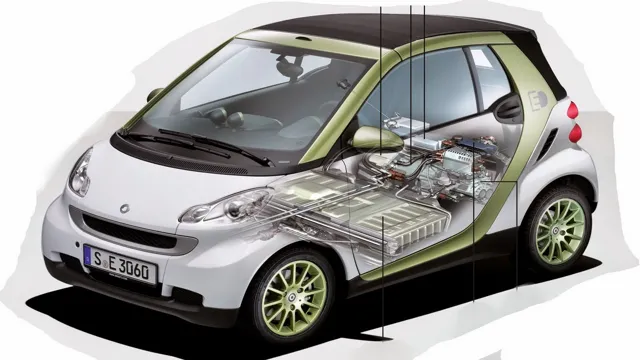Revolutionizing the Future: How Electric Car Battery Technology is Reducing CO2 Emissions
As the world transitions towards more sustainable practices, one of the biggest challenges that the automotive industry faces is reducing CO2 emissions. Electric cars have become a popular solution to this problem, but their efficiency and environmental impact remain a topic of discussion. Electric cars rely on batteries to store energy and power the motor, and these batteries have a significant impact on the car’s CO2 emissions.
This is because the production process of these batteries requires a significant amount of energy, resulting in a large carbon footprint. Therefore, finding ways to reduce CO2 emissions associated with electric car batteries is crucial for a sustainable future. In this blog, we will explore how electric car batteries can be made more environmentally friendly, the challenges the industry faces, and the solutions being developed to tackle this problem.
The Importance of Electric Car Batteries
When it comes to electric vehicles, the battery plays a critical role in their overall performance. But what many people may not realize is that these batteries are also key in reducing carbon dioxide emissions. As we continue to seek ways to combat climate change, the move towards electric vehicles has become increasingly important.
The reason for this is that electric cars run on batteries that emit significantly less CO2 than their gas-powered counterparts. In fact, studies have shown that electric vehicles can produce up to 70% fewer CO2 emissions than cars running on gasoline. This is because the batteries used to power electric cars are highly efficient, and can convert energy from the grid into motion with minimal loss.
So while there are still challenges to overcome in terms of battery cost and technology, it’s clear that investing in electric car batteries is a vital step towards a greener future.
Efficiency and Environmental Benefits
Electric car batteries are changing the game when it comes to efficiency and environmental benefits. With traditional combustion engines, more energy is lost through heat and friction, whereas electric car batteries convert more of the energy they receive into actual movement. This means electric cars can travel further distances on a single charge compared to their gas-powered counterparts.
Additionally, electric cars produce much lower emissions, reducing the amount of harmful pollutants released into the environment. When it comes time to replace electric car batteries, they can often be recycled, further reducing their impact on the environment. Investing in electric car technology not only benefits the environment, but it also saves money on fuel costs and reduces our reliance on non-renewable resources.
As more and more electric vehicles hit the road, the importance of electric car batteries will only continue to grow.

Comparison with Gasoline Cars
Electric car batteries have revolutionized the automotive industry, providing a cleaner and more sustainable form of transportation. When compared to gasoline cars, electric vehicles (EVs) have numerous advantages, with one of the most important being the batteries. Unlike gasoline cars that require frequent refueling, EVs need only to charge their batteries, which can be done quickly at home or at a public charging station.
Moreover, electric car batteries are incredibly energy-efficient, converting up to 90% of the energy stored in them into power for the car. This means that EVs can travel farther on a single charge than gasoline cars can on a full tank of gas, with many modern models boasting ranges of over 300 miles. Additionally, electric car batteries have a longer lifespan than their gasoline counterparts, with some models lasting up to 500,000 miles.
This not only reduces the need for frequent battery replacements but also makes electric cars more attractive to consumers as a long-term investment. Ultimately, the importance of electric car batteries cannot be overstated, as they are the driving force behind the growth of the EV market and a key component of sustainable transportation.
The Impact of CO2 Emissions on the Environment
One of the biggest environmental issues of our time is the impact of CO2 emissions on our planet. The burning of fossil fuels like gasoline to power our vehicles is one of the biggest contributors to CO2 emissions. This is where electric cars come in.
While electric cars do have a carbon footprint associated with the manufacturing and disposal of the batteries, they produce far less CO2 emissions compared to their gasoline counterparts when driven. In fact, studies have shown that an electric car battery produces roughly 50% less CO2 emissions than a regular car battery. This means that driving an electric car contributes much less to the overall carbon emissions and helps in the effort to reduce our carbon footprint.
With the technology continuing to advance and more and more charging stations being built, electric cars are becoming even more viable options for driving. By choosing to drive an electric car, you can help reduce your impact on the environment and contribute to a cleaner, healthier planet.
Global Warming and Climate Change
Global warming and climate change are major issues that are affecting our planet today. One of the main causes of global warming is the excessive emission of carbon dioxide (CO2) into the atmosphere. This gas is produced by various human activities such as burning fossil fuels, deforestation, and industrial processes.
CO2 is a greenhouse gas that traps heat in the atmosphere, leading to a rise in global temperatures. This rise in temperature is causing significant changes in the Earth’s climate, including more frequent and severe weather events such as droughts, floods, and hurricanes. The impact of CO2 emissions on the environment is extensive, affecting both human and non-human organisms.
It is causing sea levels to rise, resulting in the loss of habitats for sea creatures and flooding of coastal areas. The warming of the ocean waters is also leading to the death of coral reefs, which are essential ecosystems for marine life. It is crucial that we take action to reduce our carbon footprint and minimize the harmful impact of CO2 emissions on the environment.
Air Pollution and Health Risks
Air pollution is a serious issue that affects not only the environment but also human health. Carbon dioxide (CO2) emissions have a significant impact on the environment, contributing to climate change and global warming. The increased concentration of CO2 in the atmosphere has led to an increase in temperature, melting glaciers, and rising sea levels.
These changes have profound consequences, including changes in weather patterns, more frequent natural disasters, and ecological imbalances. But the impact of CO2 emissions is not limited to the environment. Studies have also shown that exposure to air pollution, including CO2, can have a significant impact on human health.
Air pollution has been linked to respiratory problems, such as asthma, chronic obstructive pulmonary disease (COPD), and lung cancer. It can also increase the risk of heart disease, stroke, and other cardiovascular conditions. Children and the elderly are particularly vulnerable to the health impacts of air pollution, as are people with pre-existing conditions such as asthma or heart disease.
But the truth is that air pollution affects us all, regardless of age or health status. It’s something that we all need to take seriously and work to address. Reducing our CO2 emissions is a crucial step in addressing air pollution and its health risks.
This can be achieved through a combination of measures, including transitioning to renewable energy sources, improving energy efficiency, and promoting sustainable transportation. By taking action to reduce our CO2 emissions, we can help protect the environment and improve public health.
Regulations and Targets for Reducing CO2
CO2 emissions have a significant impact on the environment, and the consequences of not reducing these emissions are concerning. Not only do CO2 emissions contribute to climate change, but they also have a direct impact on air quality, human health, and the natural world. The combustion of fossil fuels is the primary source of these emissions, leading governments worldwide to introduce regulations and targets aimed at reducing them.
The Paris Agreement, for example, aims to limit global warming to 2 degrees Celsius, with a target of 5 degrees Celsius if possible. Businesses must also adhere to emissions targets and disclose their carbon footprint to the public.
The impact of CO2 emissions on the environment is complex, and the solutions to reducing these emissions will require a collective effort from everyone. By reducing our carbon footprint, we can ensure a more sustainable future for ourselves and future generations.
The Role of Electric Car Batteries in Reducing CO2 Emissions
Electric car batteries are becoming an increasingly important factor in reducing CO2 emissions. While electric vehicles themselves emit no tailpipe CO2 emissions, the production of the batteries that power them can often generate significant greenhouse gas emissions. However, as battery technology continues to evolve and become more efficient, these emissions are being reduced.
In fact, electric car batteries are playing a significant role in decreasing the carbon footprint of the transportation industry. As more people switch to electric vehicles, the demand for clean energy solutions is also increasing, which in turn spurs further innovation and a greater focus on sustainability. In short, electric car batteries are not just an alternative to traditional gasoline-powered vehicles, but rather they represent a key solution for a future that is more sustainable and environmentally friendly.
Longevity and Recycling of Batteries
When it comes to reducing CO2 emissions, electric car batteries can play a significant role. Firstly, the longevity of these batteries means that they are more sustainable than traditional fossil fuel-powered vehicles. In addition, the recycling of electric car batteries can further reduce their carbon footprint.
By extracting the precious metals and materials from these batteries, we can reduce the need for new mining operations, which are known to be environmentally damaging. Furthermore, reusing the materials from electric car batteries can also contribute to the development of new and innovative technologies. Overall, the use of electric car batteries can help us reduce our emissions and move towards a more sustainable future.
Sustainable Energy Sources for Charging Batteries
Electric car batteries play a key role in reducing carbon dioxide (CO2) emissions, which is important for sustainable energy sources. With the increase in popularity of electric cars, it is essential to consider the source of the electricity used to charge the batteries. Renewable sources of energy like solar and wind power provide a clean and sustainable solution for powering electric cars.
By harnessing solar and wind energy, we can reduce our dependence on non-renewable sources like fossil fuels, which are major contributors to greenhouse gases and climate change. Even more, the use of sustainable energy sources is not only beneficial for the environment, but it also decreases the cost of charging electric car batteries, making it a more economical choice for both businesses and individuals. So, by using renewable energy sources, we can drastically decrease CO2 emissions and move towards a more sustainable future.
Conclusion and the Future of Electric Car Batteries
In the battle against climate change, electric cars with new and improved batteries have emerged as a powerful weapon. However, it is important to remember that the manufacturing process of these batteries also emits CO2 emissions. With advancements in technology and transitioning towards renewable energy sources in production, we can work towards reducing the carbon footprint of electric car batteries.
So, let’s put the pedal to the metal and drive towards a sustainable future.”
FAQs
What makes electric car batteries better for the environment?
Electric car batteries produce far less CO2 emissions compared to traditional gasoline-powered car batteries.
How long do electric car batteries typically last?
The lifespan of an electric car battery varies, but most manufacturers guarantee the battery for 8-10 years or 100,000-150,000 miles.
How much does it cost to replace an electric car battery?
Replacing an electric car battery can cost anywhere from $3,000 to $10,000 depending on the make and model of the vehicle.
How does recycling electric car batteries help reduce CO2 emissions?
When electric car batteries are recycled, rare metals and minerals are extracted which can be used in the production of new batteries. This reduces the demand for new materials and lowers the carbon footprint of battery production.
How have advancements in electric car battery technology improved CO2 emissions?
Advancements in electric car battery technology have led to longer driving ranges and shorter charging times, making electric cars more convenient and accessible. Additionally, new batteries are being developed that use less rare metals and minerals, further reducing emissions during production.







